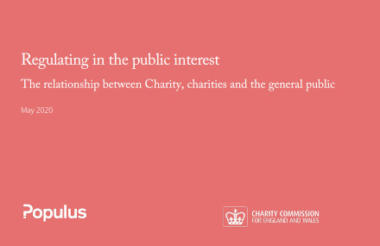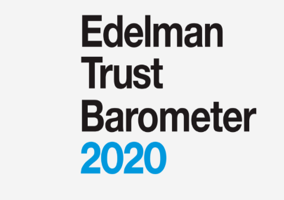Earlier this week the Charity Commission published its latest research on the relationship between the sector and the public. It is broadly good news for the charity sector, unlike in 2016 and 2018 when overall trust scores reached all-time lows.
This year the public gave the sector a score of 6.2 out of 10 – significantly more than 2018’s score of 5.5 but still below the 6.7 seen before the 2015 fundraising scandals. Naturally this leads the Commission to the conclusion that there is still more work to do.
The results are not particularly striking – many have long thought that the 2016 and 2018 scores were as a result of extremely poor behaviour by a small number of charities, and not a true reflection on the whole sector.
Unfortunately, because the research was conducted in February – before the implications of the coronavirus pandemic became clear – it is a snapshot of a world that no longer exists and could well be gone for good. Indeed, the Edelman Trust Barometer found that trust among charities rose at the start of the crisis, so there's a real chance that the Commission's research is out of date.
Nonetheless, there are some points raised in the report that deserve further consideration.
Demographic differences and similarities
This year the Commission highlights the views of people in different demographics. It has segmented the public into four groups:
- People with high diversity and high security (educated professionals in cosmopolitan areas).
- People with high diversity and low security (poorer people in densely populated urban areas).
- People with low diversity and high security (business managers in rural areas).
- People with low diversity and low security (blue collar workers in rural areas).
This throws up some interesting, if not entirely surprising trends, such as cosmopolitan professionals being more comfortable with giving to international development charities, versus blue collar rural workers being concerned about too many of them.
It also highlights where there are overlapping concerns. Overall 67% of respondents said that the nature of charity works means chief executives should not be paid the same as private sector CEOs, but this rises to 70% for those in the poorer groups.
A heatmap in the report, which places the four demographic groups into quadrants, highlights that those who are wealthy and secure are more likely to feel confident that money donated to charity is getting where it needs to.
“If you never stepped outside the most secure and diverse top-left quadrant of the map, which represents our most cosmopolitan areas where professionals mainly live, work and socialise with each other, it is easy to think there was no challenge for charities to address here,” the Commission says.
Importance of charities
One of the notable trends highlighted in the report is the number of people rating charities as essential or very important dropping to 55% in 2020, having peaked at 76% in 2012.
Those rating charities as essential saw a sharp drop from 30% in 2018 to 18% in 2020.
Similarly, just 12% of the respondents to this year’s survey said they believed charitable endeavour was something that only charities could do.
There could be a number of reasons for this. Increasing awareness of alternative structures such as community interest companies, social enterprises could have played a part, as could campaigns springing up organically on social media.
It should be noted that those rating charities as fairly important has risen over the same period from 20% to 35% – so 90% of people clearly still think charities have a role.
While it may seem as though this should be the cause of some concern for traditional charities, it could actually be a good thing if there is better public understanding of the wider civil society ecosystem. But clearly more research would need to be done to discover if that is the case.
How charities behave
An important reflection for charity leaders is that people expect charities to behave ethically.
Just over half of respondents said it was important that charities operate to “high ethical standards”.
“Motive is part of what makes charity special in the eyes of the public. It isn’t enough for charities to simply have an impact. The way they go about making a difference is as important as the difference they make,” the report says.
Responding to this, Elizabeth Chamberlain, head of policy and public services at NCVO, says the finding “dovetails” with the approach set out in her organisation's Charity Ethical Principles.
More generally, she says that the timing of the report, being published while most charities are in the middle of responding to the pandemic, means that important messages could be missed.
“There is a lot in this report that is really worth discussing,” she says, but cautions: “Everyone is still so focused on responding to the current situation and thinking about how we can plan going forward and sustainability for the next year that there may not be the headspace for these conversations.”
Collective responsibility
The Commission also asked the public for their views on the “collective responsibility” charities have to uphold the sector’s reputation.
Nearly two-thirds of the public agree that charities have this responsibility, leading the Commission to argue: “In the public mind, charities are all in this together.”
This may well be true for larger charities with a high-profile, but it seems like a big ask for smaller charities. It would help if the Commission could expand on what it really means by this, otherwise it risks adding to the burden of charities that are already struggling with shrinking incomes and rising demands on their time.
For example, what practical things should a local animal sanctuary be doing to uphold the trust in the healthcare giant down the road?
Future of the Commission
Finally, the Commission uses this research to make the case for expanding its own remit beyond its legal duties.
It cites the survey finding that 53% of the public want to see the regulator ensure that charities “fulfil their wider responsibilities to society rather than just making sure they stick to the letter of the law”.
Baroness Stowell, chair of the Commission, went a bit further in an opinion article for the Times, suggesting that there should be wide review of how charities are registered and de-registered.
The Commission has not set out any detail as to what this could mean, but experts believe this would require changes to charity law, which frankly seems unlikely at the moment.
The regulator’s desire to move beyond its legal remit provokes concern among some.
Kristiana Wrixon, head of policy at ACEVO, criticised the Commission in a blog this week, saying that that the question was “leading”.
She adds: “The report doesn’t contain any reflections on who would get to decide the ‘wider responsibilities’ to society. This raises the question of whether the Commission is positioning itself to make that kind of decision.”
How useful is it?
So, in summary, some of the headline findings may already out of date. However, there are some useful insights as to what the public expects, which should help charity leaders in forming strategic priorities (that is if they find time to read them).
There are also clear indications about the Commission’s own future intentions that charities should be alert to.
Editor's note
A line that said "only 16% of respondents said that it is important that charities treat their employees well" has been removed. Respondents were asked to select the top three factors they considered important, and 16% said "treating employees well".
Related articles












